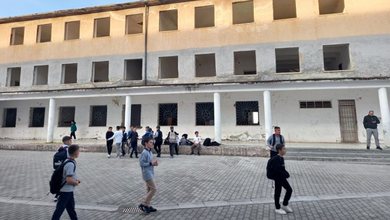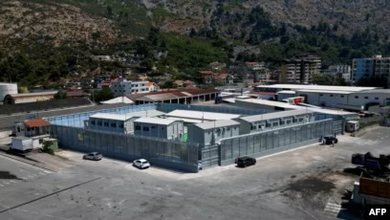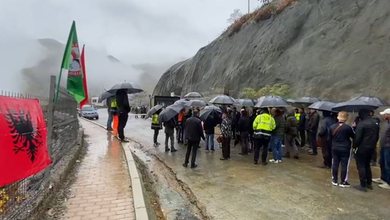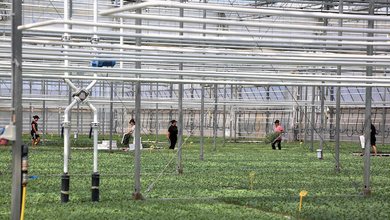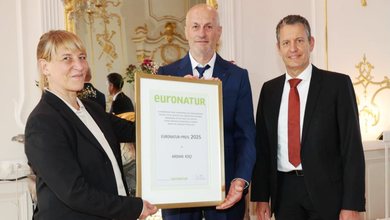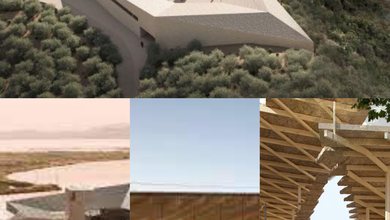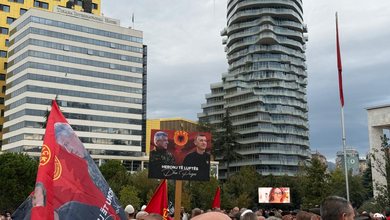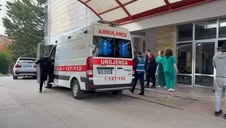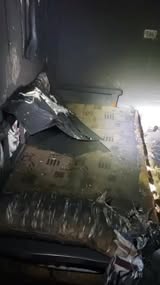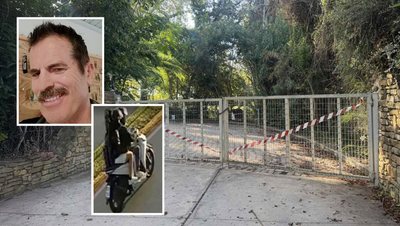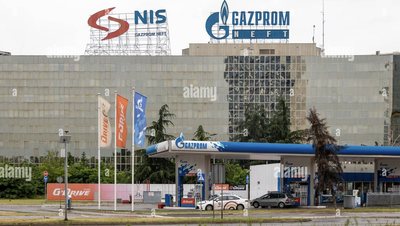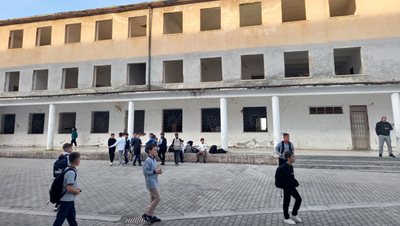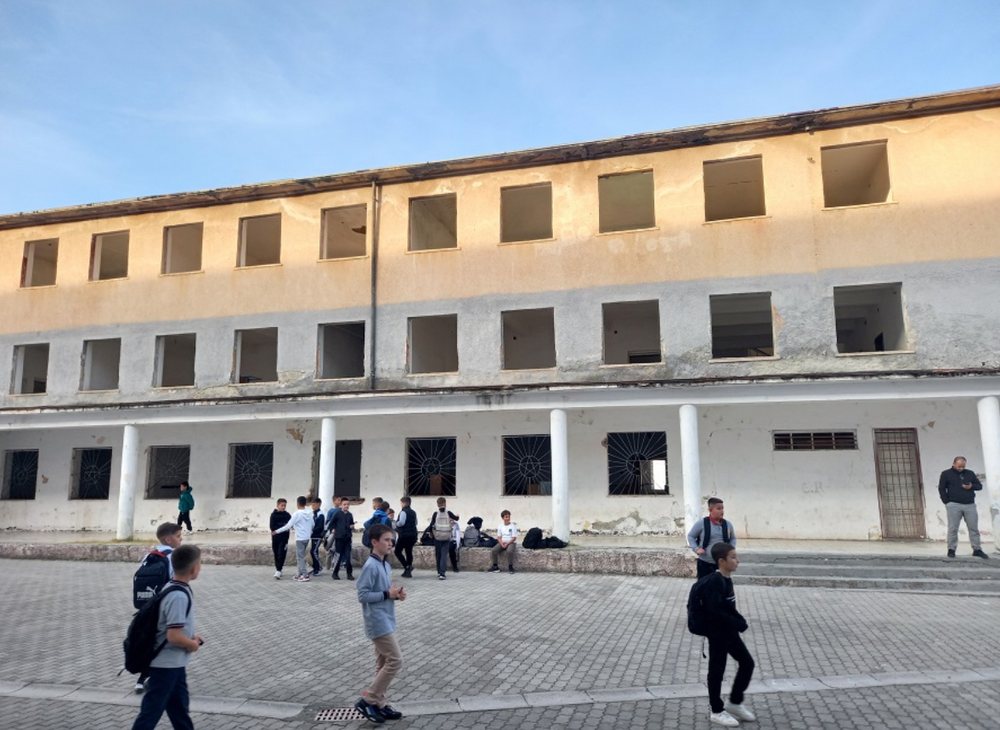
The lack of quality vocational education in the Kukës region is pushing students to travel to Prizren in Kosovo to receive education, while the Albanian government's promises have fallen by the wayside.
Every morning, Rustem Bela wakes up before dawn at his home in the village of Myç-Has and changes two cars to reach the “11 Marsi” vocational school in Prizren, about 55 kilometers to the northeast.
The 14-year-old from Has is a first-year student studying mechanics. Due to the lack of a vocational school in the Kukes region, he and four other students of his age were forced to enroll in the Kosovo education system.
"I wake up at 5:30 in the morning. My dad takes me to Kukës by car. In Kukës I join two other friends, where a car is waiting for us and together we travel to Prizren for a fee of 5 euros (round trip)," says Rustemi, while wearing his school uniform.
The “11 Marsi” Competence Center in Prizren is the largest vocational school in Kosovo and is attended by 1,500 students. It offers instruction in 18 specific profiles oriented towards four main directions: auto mechanics, electronics, construction, and applied arts.
Unlike Prizren in Kosovo, in the poor Kukës region across the border, opportunities for vocational education are limited. Despite numerous promises, there is currently only one class with about 40 vocational education students at the “Havzi Nela” high school in the Information and Communication Technology (ICT) department.
Two other branches opened years ago through assistance provided by the German organization, GIZ, did not stand the test of time.
According to education representatives in Kukës, vocational school is disadvantaged, as parents generally choose high school for their children's future. Another factor is the prejudice about the quality of the diploma in the labor market.
“The reason for the lack of vocational education in Kukes is the missing labor market,” Ylber Çiku, a specialist at the Kukes Education Office, told BIRN.
Despite the record lows, the government, through the Ministry of Economy, aims to revive vocational education in Kukes. However, a project launched in December last year has once again fallen on deaf ears.
The project envisages the reconstruction of the 9-year school “Bajram Curri” through a fund of 400 thousand euros and its transformation into a modern institution for vocational education with an estimated capacity of 300 students and trainees.
But 10 months after an inauguration ceremony, the works for the reconstruction of the school have not yet begun.
When asked by BIRN, the company “INA” that won the tender blamed the delay in obtaining the construction permit.
“The reason for not starting the works was the permit from the Territorial Development Agency. The permit has now been approved by the AZHT, where only the clarification of the permit is expected, which will happen soon to enable the start of the works,” Ferdinand Çaushi, the owner of the company, told BIRN.
“The Folly of the Century”
Students from Kukes and Hasi, studying at the 11 Marsi Competence Center in Prizren. Photo: Bashkim Shala. The “11 Marsi” Competence Center in Prizren welcomes students from Kukes and Hasi in northern Albania, according to a recruitment process led by the Kosovo Ministry of Education.
According to the deputy director for educational affairs, Dashnor Kamberi, the demand is very high, as the diplomas issued by the “11 Marsi” Competence Center are also recognized in Europe.
Kamberi also stressed that students from Albania are facing an unnecessary obstacle to enrolling in their vocational school, as the two countries do not yet recognize each other's diplomas.
“It is a ‘foolishness of the century’ that Kosovo does not recognize the diplomas of students from Albania. The same happens for the diplomas of students from Kosovo who seek to study in Albania, where nostrification, or validation of the diplomas, is required at the respective Ministries of Education,” he said, calling the validation process between the two countries an unnecessary bureaucratic procedure.
Unlike in Kukes, where vocational education students have difficult access to the labor market, in Kosovo students are paid during their internship.
Enver Bytyçi, deputy director for business relations at the “11 Marsi” Competence Center, told BIRN that the curricula have also been adapted to those followed in vocational schools in Germany.
“Profiles such as auto mechanics, plumbing, and electricity have programs like in Germany, and diplomas from this school are recognized in Germany and other Western countries,” he said.
These advantages seem to have encouraged students from Kukes to travel to Prizren to study.
Albrim Ferati, a first-year student, told BIRN that after finishing school he intended to work first in Prizren and then try Switzerland.
“After finishing school, I will not return to Kukës, but I will work in Prizren because there is a job market for central heating specialists and then I will try Switzerland,” he said.
Two of his peers from Kukës also intend to emigrate after finishing vocational school.
The leaders of the “11 Marsi” Competence Center have recently distributed scholarship applications to students from Albania, despite the fact that citizenship is an obstacle to obtaining one.
“Let them fill out the forms, maybe the responsible authorities will also consider students from Kukës,” says deputy director Kamberi.
The approach is different from the educational authorities in Kukës.
Students from Kukës who study at the Prizren vocational school seek financial support from the Albanian authorities, but this is considered impossible by them.
“The scholarship is only awarded to students studying in vocational schools in Albania, which have free capacity for students who wish to attend,” Albert Muja, director of the National Employment and Skills Agency in Kukes, told BIRN./BIRN


